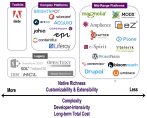Let us now praise metators
Longtime information management guru Bob Boiko is a modest guy. You won't hear him blowing his own trumpet, so I will. Bob is a consultant, professor, and author of several books, including the Content Management Bible, one of the few works in that series that's truly biblical in scope.
I find myself increasingly using a term Bob invented in that book: "Metator." We're also beginning to reference the metator function more often in our evaluation research.
Metators are really contextualizers. They look beyond the item of information itself to understand things like its relationships, impact, trajectory, findability, alternate formats, and potential consumption profile.
I've been thinking more about the term lately in connection with the web teams I debrief or consult with. Contemporary web publishing operations have become, of course, much more than shoveling an HTML file into a subfolder. Instead, most web teams deal with disembodied content items that might need to appear in multiple different contexts, on different sites, potentially across multiple different formats. Their Web CMS hopefully supports this work, but trust me, it also requires human intervention -- if only to monitor whether all-important tags got applied correctly. This is actually what the old "webmaster" role has come to: still part traffic-cop, but more so enterprise librarian and web consumer advocate.
Metators are not just found among corporate web teams. Records managers have been dealing with metadata for decades. Now, you might think of your enterprise records manager as some corporate ninny who makes you clean up your virtual bedroom. In reality, she is organizing and processing large volumes of information on behalf of the enterprise, its customers, and ultimately for you, too. She is, in short, a metator.
Metators don't need to be full-time information managers. In every department in your firm, there are some people who just know "what's going on," or who see the bigger context. KM specialists call them "connectors" and "collectors," the glue that holds things together. This makes them very powerful and surely very important, if not in title, then in practice.
In fact, metators are increasingly important to every enterprise technology we cover, from Search (for sure!) to DAM, to ECM. And also Social Software, that erstwhile bastion of crowd-sourced information organization. What is a wiki gardener, if not a metator?
Who are the metators in your organization? And what are you doing to support them?








